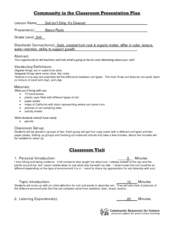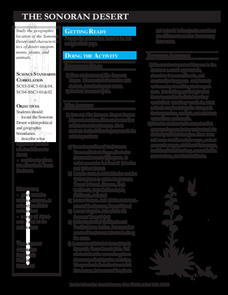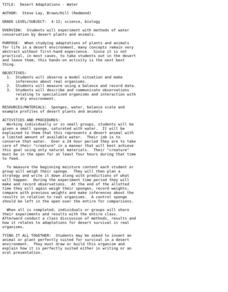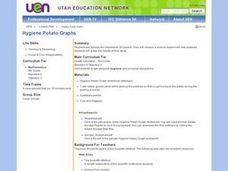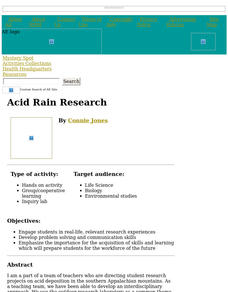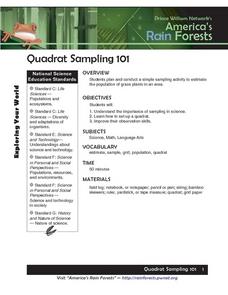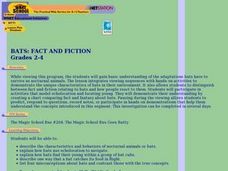Curated OER
Energy Efficient Buildings
Seventh graders create plans for an energy efficient addition to the school. They work in small groups with each group having responsibility for examining one aspect of the problem. They create working diagrams and a model of their...
Curated OER
The Importance of Trees in the Rural Area: Planting a Snowfence
Students discuss the importance of trees and work together to plant a living snowfence. In this tree importance lesson, students discuss why trees are important in rural areas. They use mathematics and team work to plant a living snowfence.
Curated OER
Language Acquisition: How Babies Learn a Language
Students create a book for small children. In this literary lesson, students examine the qualities in children's literature that capture the attention of the child. They then work in small groups to create a book to share with younger...
Curated OER
Soil Isn't Dirty; It's Diverse!
Second graders participate in a soil activity. In this soil instructional activity students complete a worksheet describing different soil types and the organic and inorganic things found in them.
Curated OER
The Sonoran Desert
Little learners examine a map of the southwestern United States and identify the Sonoran Desert. They locate different cities and rivers, determining whether or not each is found within this special ecosystem. A student handout is...
Curated OER
Oil Spill
Fourth graders watch a video about the types of products made from oil or oil used as energy to produce the product. In groups, they identify the positive and negative aspects of oil and participate in various activities. They use the...
Curated OER
Totally Termites
Students explore the world of termites, their adaptations, and anatomy. They examine the property risks of termites and how pest control professionals manage termite problems.
Curated OER
Stormy Weather
Fifth graders demonstrate their knowledge for how animals survive in natural environments when a storm occurs. For this science/writing lesson, 5th graders engage in a listening activity with the teacher. Additionally, students write a...
Curated OER
For Your Eyes Only
Students identify two major types of visible pollutants, smog, and particulate matter, They explain that air pollutants are generated during incomplete combustion. They measure and rank collectors from the most pollutants to the least...
Curated OER
Desert Adaptations: Water
Learners experiment with methods of water conservation. For this water conservation lesson, students explore the importance of water for plants and animals in a desert biome.
Curated OER
From the Gulf of Mexico to the Moons of Jupiter
High schoolers compare deep ocean conditions to those found on the moons of Jupiter. In this Earth science instructional activity, students consider the possibilities and conditions needed to support simple life. High schoolers examine...
Curated OER
Animal Adaptations
Tenth graders participate in an arthropod scavenger hunt. In groups of two, they identify and collect two specimens of arthropods in the school area, and create a table of all the specimens and what class they belong to.
Curated OER
Building a Clay Neuron
Young scholars investigate and then build neurons in this lesson. They are examined as key parts of the brain and nervous system and seen as different from normal cells.
Curated OER
What is Energy?
Learners define energy and identify the different types that exist. They identify places they see, hear or feel energy. They understand the role of engineering in finding and testing sources of energy for the production of electricity.
Curated OER
Where are the Dinosaurs?
Students find the similarities of dinosaurs and the animals of today. In this dinosaurs lesson, students understand why dinosaurs have become extinct. Students research and create dinosaur dioramas and finger puppets.
Curated OER
Do Salt Water Fish Drink?
Students conduct an experiment with potato cores and a sucrose solution to investigate how salt water fish process water. They develop a lab report of their experiment.
Curated OER
Tessellation
Young scholars create an art piece incorporating tessellating shapes, translational symmetry, reflectional symmetry,and or rotational symmetry. They are asked if they know the definition of tessellation. If so, students are asked what...
Curated OER
Hygiene Potato Graphs
Fifth graders discuss the importance of proper hygiene. After watching their teacher peel potatoes, they discuss why she was wearing rubber gloves. They demonstrate how to wash their hands properly and why one should never touch...
Curated OER
Acid Rain Research
Students collect samples of rainfall, cloud condensation, and water that trickles through the soil. These samples are tested for pH, conductivity, and the presence of sulfates, nitrates, calcium, and magnesium.
Curated OER
Water Quest
Students visit the Hydrology Study Site, conduct a visual survey to discover info about local land use and water quality, and document their findings by mapping the water body. They use this investigation to raise questions for further...
Curated OER
Water Walk
Students follow the appropriate sampling protocol and take two measurements of a local water source. These measurements are Transparency and Temperature. This info about local land use and/or water chemistry issues may require further...
Curated OER
Quadrat Sampling 101
Learners explore the population of grass plants in a given area. They plan and conduct a sampling activity to estimate the population of dandelions or the number of grass blades on the school grounds.
Curated OER
Bats: Fact and Fiction
Students describe the characteristics and behaviors of bats. After viewing a video, they explain how bats use echolocation to navigate and how they find their young within a group. They list four misconceptions about the animal and...
Curated OER
How Does a Seed Grow Into a Plant?
Second graders explore how seeds grow into plants. They discuss types of seeds and place seeds in wet paper towels to germinate. They draw a picture in their journal to record their observations for four days. They take pictures of their...





